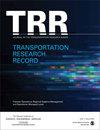使用深度学习建模变道行为的预期和放松
IF 1.8
4区 工程技术
Q3 ENGINEERING, CIVIL
引用次数: 9
摘要
变道驾驶行为建模近年来引起了人们的极大关注。现有的大多数模型都是同质的,并且没有认识到机动过程中发生的预期和放松现象。为了填补这一空白,我们采用了长短期记忆(LSTM)网络,并使用了从中国南京一辆无人自动驾驶汽车收集的视频片段中提取的大量轨迹数据。然后,我们将完全变道行为分为两个阶段,即预期和放松。对变道行为的描述分析表明,影响这两个阶段的因素有显著差异。在此背景下,提出了两个具有不同输入变量的LSTM模型,分别预测变道活动期间的预期和放松。将车辆轨迹数据进一步划分为预期数据集和松弛数据集,以训练两个LSTM模型。然后,我们使用变道行为的真实轨迹数据,应用数值测试将我们的模型与两个基线模型进行比较。结果表明,我们的模型在横向和纵向位置的轨迹预测方面都取得了最佳性能。此外,仿真结果表明,所提出的模型可以精确地复制预期现象对目标车道的影响,并且可以以合理的精度再现放松过程中变道车辆的速度和间距之间的关系。本文章由计算机程序翻译,如有差异,请以英文原文为准。
Modeling Anticipation and Relaxation of Lane Changing Behavior Using Deep Learning
Modeling lane changing driving behavior has attracted significant attention recently. Most of the existing models are homogeneous and do not recognize the anticipation and relaxation phenomena occurring during the maneuver. To fill this gap, we adopted long short-term memory (LSTM) network and used large quantities of trajectory data extracted from video footage collected by an unmanned automated vehicle in Nanjing, China. Then, we divided complete lane changing behavior into two stages, that is, anticipation and relaxation. Description analysis of lane changing behavior revealed that the factors affecting the two stages are significantly different. In this context, two LSTM models with different input variables were proposed to predict the anticipation and the relaxation during the lane changing activity, respectively. The vehicle trajectory data were further divided into an anticipation dataset and a relaxation dataset to train the two LSTM models. Then we applied numerical tests to compare our models with two baseline models using real trajectory data of lane changing behavior. The results suggest that our models achieved the best performance for trajectory prediction in both lateral and longitudinal positions. Moreover, the simulation results show that the proposed models can precisely replicate the impact of the anticipation phenomenon on the target lane, and the relationship between the speed and spacing of the lane changing vehicle during the relaxation process can be reproduced with reasonable accuracy.
求助全文
通过发布文献求助,成功后即可免费获取论文全文。
去求助
来源期刊

Transportation Research Record
工程技术-工程:土木
CiteScore
3.20
自引率
11.80%
发文量
918
审稿时长
4.2 months
期刊介绍:
Transportation Research Record: Journal of the Transportation Research Board is one of the most cited and prolific transportation journals in the world, offering unparalleled depth and breadth in the coverage of transportation-related topics. The TRR publishes approximately 70 issues annually of outstanding, peer-reviewed papers presenting research findings in policy, planning, administration, economics and financing, operations, construction, design, maintenance, safety, and more, for all modes of transportation. This site provides electronic access to a full compilation of papers since the 1996 series.
 求助内容:
求助内容: 应助结果提醒方式:
应助结果提醒方式:


